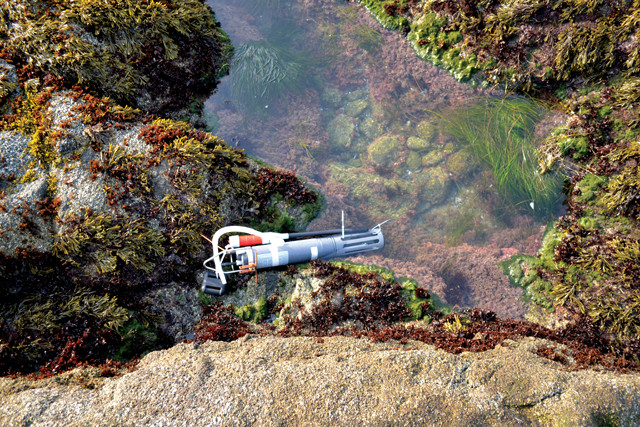
by Lucas Joel Thursday, July 14, 2016

A sampling pump and a sensor that measures temperature, salinity and depth sit in a tide pool at the University of California at Davis' Bodega Marine Reserve. Credit: Lester Kwiatkowski.
Carbon dioxide absorbed by the oceans causes seawater to become more acidic, which, as scientists have long been documenting, can negatively impact marine animals; for example, acidified waters damage the calcite skeletons and shells of organisms like coral, mussels and oysters by causing them to dissolve. In a new study, scientists have found that ocean seawater acidification may also be taking a toll on shelled organisms like coralline algae, bivalves and gastropods residing in tide pools along California’s coastlines.
esearchers examined conditions in natural tide pools near the University of California at Davis’ Bodega Marine Laboratory north of San Francisco. During the daytime, organisms such as algae photosynthesize, taking carbon dioxide out of the water and, as a result, reducing the water’s acidity slightly. But at night, both plants and animals respire like humans, taking in oxygen and expelling carbon dioxide, so carbon dioxide is added back into the seawater in the tide pools, thus increasing acidity levels, the authors noted in Scientific Reports.
he team found that calcification rates in the tide pools did indeed drop at night compared to during the day, and that higher dissolution rates were associated with higher acidities. “This work highlights that even in today’s temperate coastal oceans, calcifying species such as mussels and coralline algae can dissolve during the night due to the more-acidic conditions caused by community respiration,” said lead author Lester Kwiatkowski of the Carnegie Institution for Science in Stanford, Calif., in a statement.
© 2008-2021. All rights reserved. Any copying, redistribution or retransmission of any of the contents of this service without the expressed written permission of the American Geosciences Institute is expressly prohibited. Click here for all copyright requests.